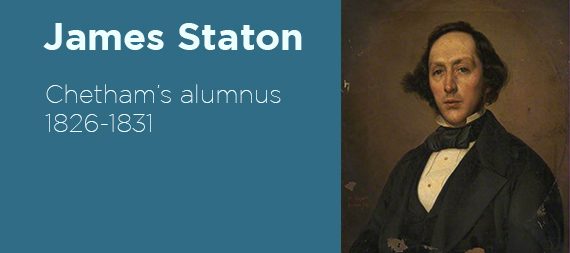Remembering an alumnus – 180 years on

James Taylor Staton, alumnus of Chetham’s Hospital (1826-1831) – at the time, a Blue Coat School – was one of Bolton’s most well-regarded businessmen and writers. Born in January 1817 and left fatherless at an early age, James enrolled at Chetham’s aged 9.
On leaving school James was apprenticed to Robert Holden, printer of Bolton, before he set up his own business as a printer, publisher, and editor, eventually becoming Editor of the Bolton Evening News. However, he is perhaps best known as Lancashire’s greatest dialect writer. After starting his own satirical journal in 1852, The Bowton Loominary, James grew to be a popular, successful and well-loved humourist, with many of his works formed around the Lancashire dialect.
But James Taylor Staton was not just a businessman and writer: he took an active and sincere interest in politics. A staunch advocate of the cause of workers, in July 1853,
he wrote a powerful article regarding dangerously long working hours in the ‘Bleachers and Dyers’ Industry. The result of this article was the passing of the Bleachers Short Time Act in 1861. Taylor Staton also fathered the movement calling for the repeal of the Death Tax in Bolton, the success of which he was rewarded with a portrait of himself that is still housed within Bolton Museum’s collections today. James passed away in 1875; his funeral was well attended by various representatives of local newspapers, local government, and the printing industry, a clear sign of his popular character and his influential position in Bolton society.
We would like to thank Diana Staton, a long time supporter of Chetham’s and descendant of James, for her thorough and rewarding research into his fascinating past. Diana has recently decided to immortalise her ancestor by naming a seat in the new Stoller Hall, in honour of the bicentenary of his birth. We very much look forward to revealing his legacy when the Hall opens in April.
Are you, or do you know an alumnus of Chetham’s – from any era? We’d love to hear from you to find out what you’re doing now and invite you to join our alumni network.



